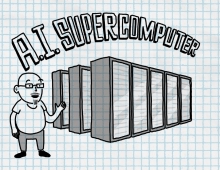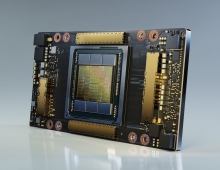
Carnegie Mellon Artificial Intelligence Beats Top Poker Pros
Libratus, an artificial intelligence developed by Carnegie Mellon University, made history by defeating four of the world's best professional poker players in a marathon 20-day poker competition at Rivers Casino in Pittsburgh.
Once the last of 120,000 hands of Heads-up, No-Limit Texas Hold'em were played on Jan. 30, Libratus led the pros by a collective $1,766,250 in chips. The developers of Libratus - Tuomas Sandholm, professor of computer science, and Noam Brown, a Ph.D. student in computer science - said the sizable victory is statistically significant and not simply a matter of luck.
"The best AI's ability to do strategic reasoning with imperfect information has now surpassed that of the best humans," Sandholm said.
This new milestone in artificial intelligence has implications for any realm in which information is incomplete and opponents sow misinformation, said Frank Pfenning, head of the Computer Science Department in CMU's School of Computer Science. Business negotiation, military strategy, cybersecurity and medical treatment planning could all benefit from automated decision-making using a Libratus-like AI.
"The computer can't win at poker if it can't bluff," Pfenning said. "Developing an AI that can do that successfully is a tremendous step forward scientifically and has numerous applications. Imagine that your smartphone will someday be able to negotiate the best price on a new car for you. That's just the beginning."
The event was surrounded by speculation about how Libratus was able to improve day to day during the competition. It turns out it was the pros themselves who taught Libratus about its weaknesses.
"After play ended each day, a meta-algorithm analyzed what holes the pros had identified and exploited in Libratus' strategy," Sandholm said. "It then prioritized the holes and algorithmically patched the top three using the supercomputer each night. This is very different than how learning has been used in the past in poker. Typically researchers develop algorithms that try to exploit the opponent's weaknesses. In contrast, here the daily improvement is about algorithmically fixing holes in our own strategy."
Sandholm also said that Libratus' end-game strategy, which was computed live with the Bridges computer for each hand, was a major advance.
"The end-game solver has a perfect analysis of the cards," he said.
It was able to update its strategy for each hand in a way that ensured any late changes would only improve the strategy. Over the course of the competition, the pros responded by making more aggressive moves early in the hand, no doubt to avoid playing in the deep waters of the endgame where the AI had an advantage, he added.
Sandholm will be sharing all of Libratus' secrets now that the competition is over, beginning with invited talks at the Association for the Advancement of Artificial Intelligence meeting Feb. 4-9 in San Francisco and in submissions to peer-reviewed scientific conferences and journals.





















